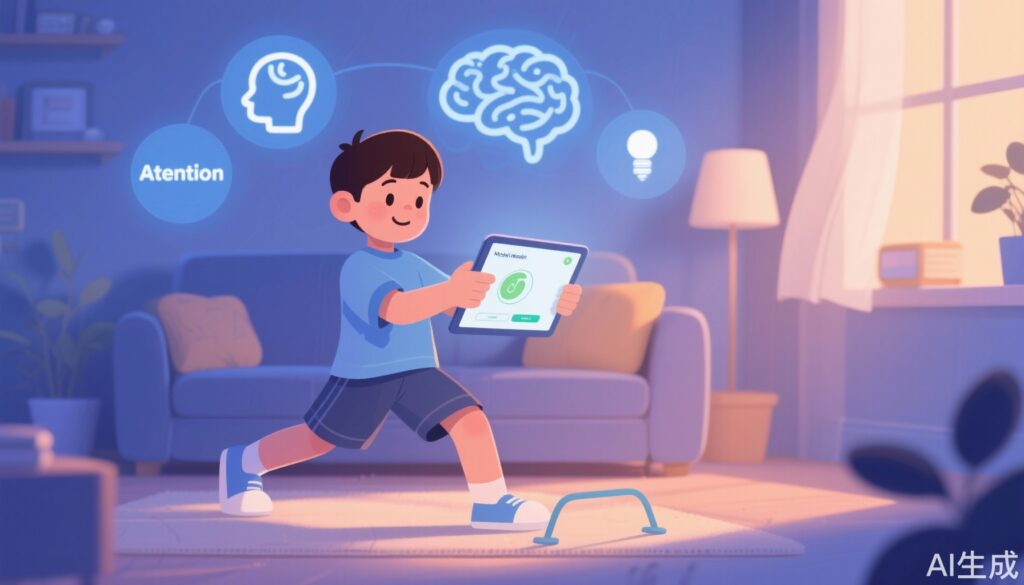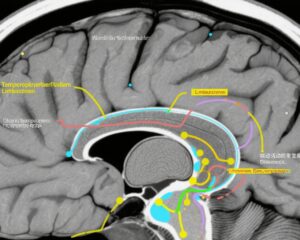Highlight
This randomized controlled trial assesses the efficacy of a self-developed mobile health (mHealth) app delivering a personalized exercise rehabilitation program for children with ADHD. The study finds that the mHealth intervention significantly reduces core ADHD symptoms—namely inattention and hyperactivity/impulsivity—and enhances executive functions such as inhibitory control, working memory, and cognitive flexibility. The effect sizes are comparable to those achieved via traditional offline, coach-led exercise programs.
Study Background and Disease Burden
Attention-deficit/hyperactivity disorder (ADHD) is a prevalent neurodevelopmental disorder affecting 5-7% of children globally. It is characterized by persistent symptoms of inattention, hyperactivity, and impulsivity that cause significant impairments in academic, social, and family functioning. Executive functions (EFs)—including inhibitory control, working memory, and cognitive flexibility—are commonly impaired in ADHD, contributing to difficulties in self-regulation and adaptive behavior.
Pharmacologic treatments, although effective for many, are associated with side effects and not universally accepted or adhered to. Behavioral interventions, including structured exercise programs, have shown benefit in improving ADHD symptoms and EFs by modulating neurobiological pathways related to attention and self-control. However, access to guided exercise interventions is often limited by geographic, logistic, or financial barriers.
Mobile health (mHealth) platforms offer promising avenues to extend evidence-based interventions remotely, providing personalized support tailored to each child’s needs. This study evaluated whether an mHealth app delivering tailored, video-guided exercise rehabilitation could improve core ADHD symptoms and executive function compared to offline coach-led exercise and minimal intervention controls.
Study Design
This randomized controlled trial enrolled 144 children aged 6 to 12 years diagnosed with ADHD. Participants were randomized into three groups: Experimental Group 1 (EG1, n=53) received exercise interventions through tailored video content via an mHealth app used by children and their parents; Experimental Group 2 (EG2, n=45) was provided integrated physical and cognitive-demanding exercise interventions delivered in-person by coaches offline; Control Group (CG, n=46) received minimal intervention consisting of physical activity education.
Intervention frequency was three times per week for 12 weeks, with each session lasting 45 to 60 minutes. Core symptom outcomes—parent-rated inattention and hyperactivity/impulsivity—were assessed using the Swanson, Nolan, and Pelham version IV (SNAP-IV) rating scale. Executive functions were measured using validated neuropsychological tests: Stroop Color and Word Test (inhibitory control), Rey-Osterrieth Complex Figure Test (working memory), and Trail Making Test (cognitive flexibility).
A linear mixed effects model analyzed changes from baseline to study endpoint while adjusting for covariates including age, sex, IQ, ADHD subtype, and medication status.
Key Findings
Both EG1 (mHealth-assisted) and EG2 (offline) interventions produced statistically and clinically significant improvements compared to control.
- Inattention: EG1 reduced scores by β = -3.54 (SE 0.96, p < 0.001) and EG2 by β = -3.98 (SE 1.00, p < 0.001) relative to CG.
- Hyperactivity/Impulsivity: EG1 and EG2 lowered scores by β = -2.88 (SE 0.81, p < 0.001) and β = -3.50 (SE 0.84, p < 0.001) versus CG, respectively.
- Inhibitory Control: Improvement measured by Stroop test was significant for EG1 (β = -8.48, SE 3.27, p = 0.016) and EG2 (β = -9.41, SE 3.46, p = 0.016) compared with control.
- Working Memory: Both experimental groups showed significant enhancement in delayed details (EG1: β = 4.00, SE 1.07, p < 0.001; EG2: β = 5.72, SE 1.14, p < 0.001) compared with CG.
- Cognitive Flexibility: Significant group differences were evident between EG1 and CG (β = -17.9, SE 8.57, p = 0.039), EG2 and CG (β = -39.80, SE 9.55, p < 0.001), and between EG1 and EG2 (β = 21.9, SE 9.12, p = 0.027), indicating a stronger effect in the offline coach-led group.
These results suggest that the mHealth app with personalized exercise programming is nearly as effective as face-to-face exercise interventions in reducing core symptoms and improving executive functioning.
Expert Commentary
This study addresses a critical gap in access to evidence-based exercise interventions for ADHD by demonstrating the feasibility and efficacy of mHealth platforms. The comparable outcomes from the mHealth group support a paradigm shift toward scalable, remotely delivered rehabilitation programs, especially valuable in settings with limited healthcare resources or during disruptions such as pandemics.
Nonetheless, the absence of posttraining follow-up limits insights into the durability of benefits. Further research should assess long-term effects, adherence sustainability, and whether gains translate into functional improvements in academic and social domains.
Integrating parent involvement and individualized tailoring via app-based assessments enhances engagement and intervention relevance. Combining physical and cognitive demands likely targets neuroplasticity mechanisms underlying executive function enhancement.
Limitations
The primary limitation of the study is the lack of a post-intervention follow-up to determine the persistence of therapeutic effects. Additionally, potential bias inherent to parent-rated symptom reporting and relatively short intervention duration should be noted. Future studies could incorporate objective measures and extended observation periods.
Conclusions
The findings support the use of a tailored, personalized exercise rehabilitation program delivered through a mobile health application as an effective intervention for reducing inattention, hyperactivity/impulsivity, and improving executive functions in children with ADHD. mHealth delivery provides a viable and accessible alternative to traditional, face-to-face exercise programs. This innovation could expand therapeutic reach and foster self-management in pediatric ADHD populations. Longitudinal investigations are warranted to establish sustained clinical outcomes and optimize digital intervention designs.
References
Zhu F, Kuang D, Zhu X, Xu B, Lin S, Chen J, Bi X, Li Z, Yang L, Wang Y, Zhao G, Yang Y, Ren Y. Efficacy of a mobile health with tailored personalized exercise rehabilitation program for ADHD children: randomized controlled trial. J Affect Disord. 2025 Oct 15;387:119495. doi: 10.1016/j.jad.2025.119495. Epub 2025 May 28. PMID: 40447145.
Additional references supporting exercise and executive function in ADHD:
- Verret C, Guay MC, Berthiaume C, Gardiner P, Béliveau L. A physical activity program improves behavior and cognitive functions in children with ADHD: an exploratory study. J Atten Disord. 2012;16(1):71-80.
- Chang YK, Liu S, Yu HL, Lee YH. Effect of acute exercise on executive function in children with attention deficit hyperactivity disorder. Arch Clin Neuropsychol. 2012 Jun;27(2):225-37.



